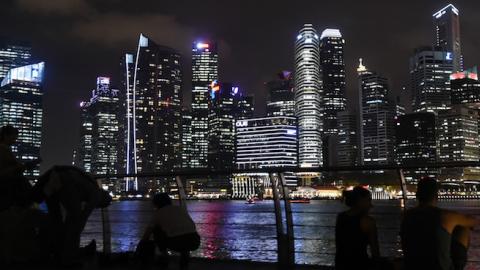You can tell that the 1MDB scandal is rocking Malaysian politics when the godfather of the Malaysian political establishment, the grand old man himself, takes notice. And his approach is revealing: Blame Singapore!
The FT reports
In an interview with the Financial Times, Malaysia’s influential former prime minister accused Singapore of failing to target the protagonists in what is alleged to be a global scheme to siphon off more than $3.5bn from the fund.
“Notice that the government of Singapore is very reluctant to pinpoint the people involved in this corruption,” Mr Mahathir said. “It affects Singapore’s reputation as a financial centre. It is not doing the right thing. The people who accepted the bribes are not the people who are laundering the money.”
“Blame Singapore” is one foundation of modern Malaysian politics, and a rousing rallying cry among ethnic Malays. The Chinese, who entered Malaysia when it was part of the British Empire, were the leaders in business and the professions in colonial Malaya. For the Malays, the independence movement was in part an effort to recover control of their own affairs before the Chinese, often favored by British imperial policy, dominated the country. After independence, a massive program of economic and social affirmative action came into place in order to create an unshakeable Malay establishment in politics, business, and the professions that would ensure that the future of Malaysia would be in the hands of the ethnic majority.
Malaysia’s New Economic Policy (NEP) lumped the Malays and a few indigenous groups into a single favored class, the Bumiputera, who would stand to gain at the expense of the Chinese minority who had dominated the country’s economy. The program has been successful in building a Malay middle class, according to these findings from the UN:
The NEP has been associated with the First Outline Perspective Plan [OPP] for 1971–1990. The OPP sought to reduce poverty from 49 per cent in Peninsular Malaysia in 1970 to 16 per cent in 1990. The actual poverty rate in the peninsula in 1990 was 17 per cent, while the national rate was slightly higher. The NEP’s main restructuring target was to raise the bumiputera share of corporate stock ownership from 1.5 per cent in 1969 to 30 per cent in 1990. The government’s data suggest that bumiputera ownership rose to about 18 per cent in 1990 and slightly over 20 per cent in 2000. Although the government originally envisaged that much of the bumiputera corporate wealth would be held by trust agencies, private individual bumiputera ownership has risen from less than a third to over 90 per cent.
This program, and its consequences, remain at the center of Malaysian life today. For anybody drawn to build a strong political coalition, making affirmative action for the majority is a great idea. For example, you can promise huge financial rewards to business leaders who back you. This isn’t bribery—it’s making the majority the master in its own house. And, of course, Chinese businesses who know what is good for them will make appropriate gifts to politicians and other powerful figures to avoid being singled out for punitive government action.
Singapore, a Chinese-majority city in a Malay-majority country, was expelled from the Malaysian federation to ensure better control of the economy by native Malays. In the beginning, Singapore, a small territory with no natural resources to speak of, was expected to fail. Over time however, it succeeded brilliantly and a certain rivalry between Singapore and Malaysia remains to this day. At the same time, Singapore’s business and banking establishment maintains many dealings with the Malaysian business and political world.
Whether or not the Malaysian policy of promoting the economic welfare of ethnic Malays through a massive government program of favoritism is a good thing is something for the people of Malaysia to decide. But there is no doubt that this program created massive temptations for corruption among Malaysia’s business and political elites. The scandal involving 1MDB, in which large amounts of money in a fund earmarked for development, have disappeared, apparently to the benefit of high ranking Malaysian officials, is so damaging because it looks so much like the natural and inevitable result of the country’s development policy that has lasted a generation. It cuts at the stability of the country’s basic political arrangements and at the ability of its institutions to manage the corrosive pressures that a politicized development strategy inevitably creates.
With all its problems, Malaysia is a success story compared to many other postcolonial countries. It has managed the problems of ethnic and religious diversity better than many, and the Arab world for example can only envy its economic prosperity. But postcolonial state-building strategies, however necessary they once may have been, often have long-term costs. This is what the scandal is really about, and the response to “Blame Singapore” as a way of blaming the scandal on an ethnically Chinese-dominated rival is a sign that the Malaysian establishment isn’t yet ready to move away from the old way of doing things.

















